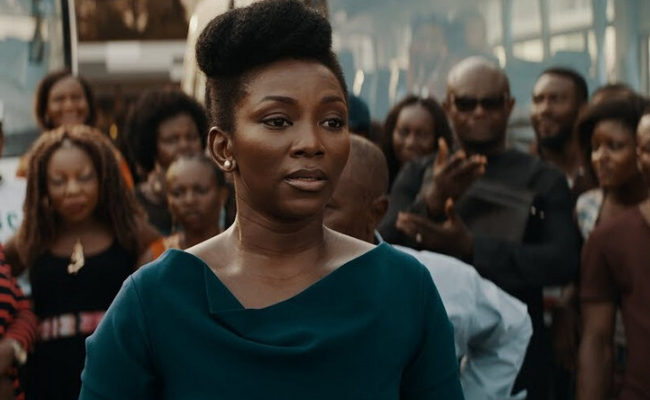The movie was submitted for consideration for the International Feature Film category. However, Lionheart is partly in the Igbo language, and predominantly English.
The rules for the International Feature Film category states that entries must have a predominantly non-English track.
The film was first launched at the TIFF 2018, shortly after Netflix acquired it for an unspecified amount. Following the announcement that Lionheart had been submitted for Oscars consideration, Genevieve took to social media to share how proud she was to carry the torch for Nigeria. She wrote:
“The Nigerian Oscar Selection Committee has chosen @lionheartthemovie to represent Nigeria for the 2020 Academy Award for Best International Film! This is the first entry ever for Nigeria.
“It’s an honor to be a part of such a pivotal moment in the history of Nigerian cinema. A moment we know will be replicated as our stories continue to resonate with audiences around the world.
“On behalf of the entire LIONHEART team and TEN Productions, we are grateful for this recognition and proud to carry the torch. Thank you all for the love and support thus far. (red heart emoji) ??”
Following this disqualification, the number of films in contention for the award has dropped from 93 to 92. Additionally, the number of female-directed films in contention is now 28.
Genevieve Nnaji, who both acted and directed the film took to her social media to react to the disqualification. She reacted to an incensed tweet shared by American filmmaker, Ava DuVernay, who shared:
“To @TheAcademy, You disqualified Nigeria’s first-ever submission for Best International Feature because its in English. But English is the official language of Nigeria. Are you barring this country from ever competing for an Oscar in its official language?”
https://twitter.com/ava/status/1191481642734387200?s=20
To which Genevieve replied:
“Thank you so much @ava. I am the director of Lionheart. This movie represents the way we speak as Nigerians. This includes English which acts as a bridge between the 500+ languages spoken in our country; thereby making us #OneNigeria. @TheAcademy
“It’s no different to how French connects communities in former French colonies. We did not choose who colonized us. As ever, this film and many like it, is proudly Nigerian. @TheAcademy”
1/1 1/2 Thank you so much @ava??.
I am the director of Lionheart. This movie represents the way we speak as Nigerians. This includes English which acts as a bridge between the 500+ languages spoken in our country; thereby making us #OneNigeria. @TheAcademy https://t.co/LMfWDDNV3e— Genevieve Nnaji MFR (@GenevieveNnaji1) November 4, 2019
2/2 It’s no different to how French connects communities in former French colonies. We did not choose who colonized us. As ever, this film and many like it, is proudly Nigerian. @TheAcademy https://t.co/LMfWDDNV3e
— Genevieve Nnaji MFR (@GenevieveNnaji1) November 4, 2019
Many others were outraged by the decision, taking to social media to air their frustrations. Some people criticized the decision to disqualify it because it is in English, asserting that it ignores Nigeria’s history of colonialism. Others supported the decision, claiming that the rules should have been examined before the film was submitted. Read some reactions below.
The disqualification of the film lionheart was valid.
Always educate yourself on subjects before being in your feelings and getting all sentimental .
That category is majorly non-English dislogue films!
Has nothing to do with witch-hunt.— Andy (@andeeblayz) November 5, 2019
Lionheart is a very solid debut for Genevieve & was Nigeria’s first ever entry to the Oscars. It showcased Nigerian culture & is quintessentially Nigerian but to deem it not culturally-specific enough because it’s in English blatantly ignores our complex history of colonialism.
— ?? DaddyMO??? (@therealdaddymo1) November 5, 2019
So if Lionheart had been produced and scripted in the Igbo and Hausa language that the storyline was based on, but given English subtitles, would it have qualified for the Oscar in the category of Best International Feature Film? ???????????
— ?? DaddyMO??? (@therealdaddymo1) November 5, 2019
“Lionheart” has been disqualified from the Oscars because it’s mostly in English which violates their Best International Feature Film rule. Fine, we move but if you come and say the movie is wack & doesn't stand a chance at the Oscars, make I clear you now, your brain don pafuka.
— ?. ?. ?. ???? (@AimThaMachine_) November 5, 2019
https://twitter.com/Cutewalterr/status/1191597286217977856?s=20
https://twitter.com/MeetTheRichard/status/1191591664541933568?s=20
LionHeart’s disqualification from the Oscars is a very disgraceful one. And the reason they gave is a shallow one. “A Nigerian movie shouldn’t have so much English in it” but our official language in Nigeria is English language. What exactly does that mean?? BS!
— Mazi Olisaemeka C. ™ (@OlisaOsega) November 5, 2019
https://twitter.com/MeetTheRichard/status/1191589182688374784?s=20
https://twitter.com/_omoissy/status/1191608954436116480?s=20
Since a decade ago, Oscar stopped movies in that category made predominantly in English language just like LionHeart.
An Israeli movie "The Band" was disqualified in 2007 for the same reason.
Y'all slow down on the "African discrimination" talk on this issue.
Rules are rules.
— UG (@UgwunnaEjikem) November 5, 2019


